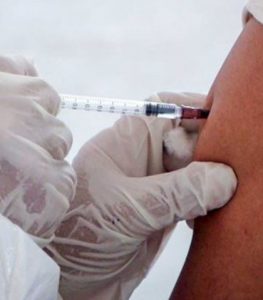Barriers to refugee vaccination lifting slowly – report
Increasing numbers of countries are including refugees and migrants in their national COVID-19 vaccination plans, but a new report reveals there are still barriers to equitable access.
A new report by the International Federation of Red Cross and Red Crescent Societies (IFRC) says that 92 per cent of the 52 countries surveyed said that limited information or awareness about how to get vaccinated was preventing refugees and migrants from receiving shots, while 67 per cent said language barriers are playing a role.
 Ninety percent of the 52 societies surveyed said that limited information or awareness about how to get vaccinated was preventing refugees and migrants from receiving shots, while 67 per cent said language barriers are playing a role.
Ninety percent of the 52 societies surveyed said that limited information or awareness about how to get vaccinated was preventing refugees and migrants from receiving shots, while 67 per cent said language barriers are playing a role.
IFRC spokesperson Ezekiel Simperingham said the findings were alarming.
“It’s one thing to have recognition and protection in law but a very separate — and, in some ways, connected — thing to make sure that happens in practice,” Mr Simperingham said.
“An example is a government or a county that says undocumented migrants can be included in vaccination campaigns, but when it comes to that undocumented migrant wanting to be included in that campaign, seeking to receive a vaccine, that they face some practical barriers to being able to do so. For us, we call that the ‘invisible wall’ that migrants face,” he said.
While less than 30 per cent of societies reported policies excluding refugees and migrants from coronavirus vaccination campaigns, many other barriers remain for them, the report said.
Administrative barriers such as legal documentation are preventing refugees and migrants from accessing vaccines in 60 per cent of countries, the report said.
Thirty-three percent of countries surveyed had registration processes that were too hard or time-consuming, and in 20 per cent of countries there were no appointments available when refugees and migrants attempted to register.
People can also be fearful that giving health authorities the information required to get a vaccine could put them in danger of being arrested, detained, or deported if they are undocumented, the report said.
Some countries also reported vaccine hesitancy playing a role, with 80 per cent saying a fear of developing side effects was impacting vaccination rates.
Fifty percent said there was an insufficient supply of doses.
“It’s one thing to have hesitancy and practical barriers for migrants in the community, but it’s a very other thing for the vaccine to even be available,” Mr Simperingham.
“We need to, first of all, get the vaccine to the tarmac, to the airports in countries that are hosting large numbers of migrants who are not receiving the vaccine. Then, doses must get in the arms of migrants,” he said.
Regionally, most countries in Latin America and the Caribbean – home to 14.8 million migrants – have now included them in national vaccination plans, according to IFRC.
Over 75 per cent of countries in the Middle East and northern Africa are incorporating refugees and migrants in their national plans, while many countries in Africa and Asia Pacific are also doing so.
In Europe, Germany – the country with the fifth-largest number of refugees in the world – is including asylum-seekers and refugees in its vaccination plan.
Mr Simperingham said that IFRC is advocating for equitable access – not prioritisation – for refugees and migrants in attaining vaccines.
“If people are left out of vaccine campaigns, there’s a risk that those campaigns become ultimately self-defeating,” he said.
“If we don’t reach everyone in the community or provide access to everyone in the community to vaccines, then we have the risk of further mutations of the virus, and the protection for the rest of the population through vaccines not being as effective.
“Whatever your public health goal is through a vaccination campaign, it will not be achieved if you do not vaccinate everyone,” Mr Simperingham said.












